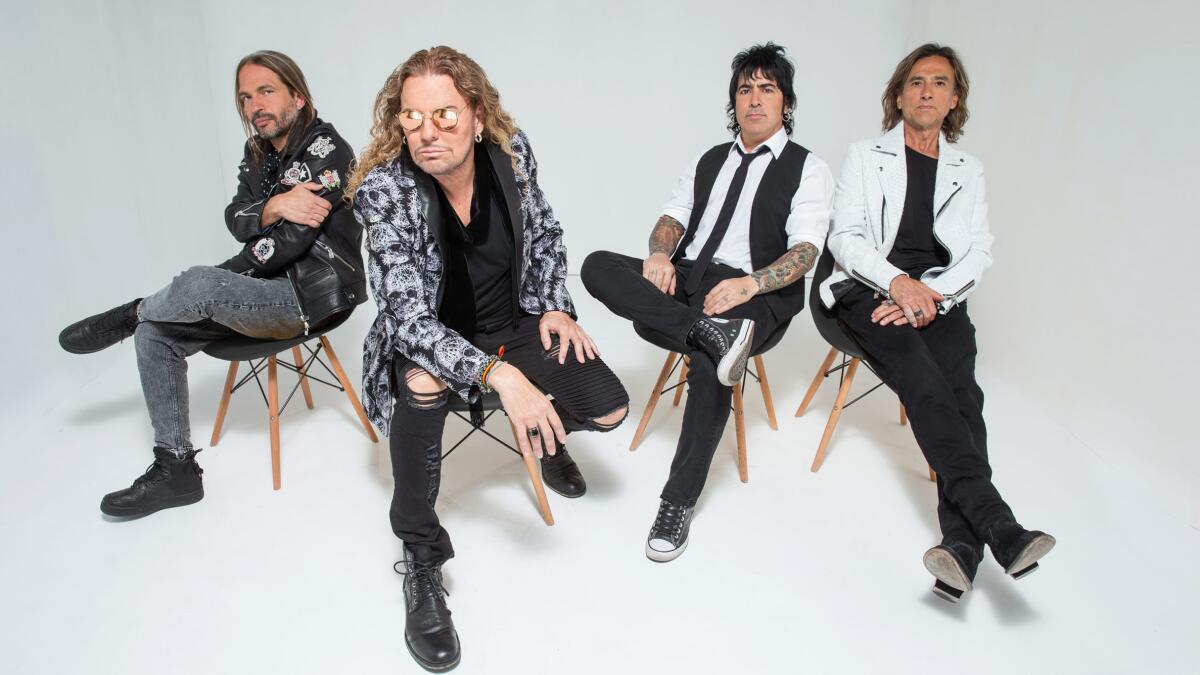‘Los Angeles has it all’: Mexican superstars Maná on their home away from home

- Share via
Twenty-eight years have passed since that show at the Palladium on Sunset Boulevard when Maná first stood before an L.A. audience. A romance was kindled that night between the Mexican pop-rock band and the California city that today is like Maná’s second home.
Since then, no place has received the acclaimed band from Guadalajara — lead vocalist and guitarist Fher Olvera, drummer Álex González, bassist Juan Calleros and guitarist Sergio Vallín — more frequently or rapturously than L.A. Several years ago, Maná — owners of four Grammys and eight Latin Grammys, and the first Spanish-language rock band to receive a star on the Hollywood Walk of Fame — broke a concert record held by the Eagles when it played seven times at the Forum in Inglewood. Maná returns to the Forum on Friday and Saturday, with two more scheduled dates each in April, June and July, extending its streak of annual L.A. residencies.
“The idea is to continue until people get tired of us,” Olvera says.
Olvera and Vallín spoke with The Times about their deep attachment to Los Angeles, the politics of COVID-19 and and the postponement of a comprehensive immigration reform bill.

Many artists think of doing a musical residency in Las Vegas. You decided to do one in Los Angeles. Why?
Olvera: Los Angeles has it all. It has connections to the entire world. It is a city that we love deeply. It is the city, practically in the entire world, that suits us best.
You’ve waited until 2022 to resume touring, although other artists and groups started last year. I imagine that you did it with caution so that people could recover economically from the pandemic.
Olvera: Yes, just like you say. And you appear to be Mexican...?
I’m Peruvian.
Olvera: Ah, Peruvian. But you do know the song “El Rey”?
Yeah, sure.
Olvera: The one that says, “You don’t have to get there first, you have to know how to get there.” That is the important thing here, that there is access to the tickets, a positive cost-benefit. We bring the same equipment as a group like Coldplay or U2, tons of equipment, but the ticket prices for those groups and many others — I include Latinos — are very different from ours. We do make tickets accessible and we also get closer to people, to those who don’t have the ability to buy such an expensive ticket.
Los Angeles is quite important to you. You were willing to donate the rights to your songs so that L.A. schools could teach Spanish. Why?
Olvera: We deeply admire the Latino community, the Mexican community. We know that they, or their parents, found it difficult in the past and have come here to work — they have made this country great. We have respect and admiration for all these people.
And we have to start at the bottom: The gringos don’t yet trust us to the degree that they should, but here we come. We embrace human rights with a great passion. We spoke four or five times with President Obama, but we didn’t have that opportunity with the next president [Trump] because we detached ourselves from him. To us, he seemed extremely racist and radical, with the policies he passed. Then come Democrats [like Biden] who are more pro-Latino.
But the fact is that Latinos are awesome. And we have seized Los Angeles as a way to reconquer a part that was ours, of Mexicans, and we have conquered it culturally, peacefully, artistically, economically. The power that Latin Americans have in the United States, both economically and politically, is impressive. It is something that we have been living for these last 30 years.
At the Forum in 2019, you were asking people to go out and vote their conscience, for whoever they wanted, but to come out and vote. Today we have a president who understands the needs of Latinos, but that long-awaited immigration reform that was promised still hasn’t arrived. How do you see it?
Olvera: It’s very bad. There must be immigration reform to allow work for the Mexicans and Latin Americans. Let’s not play the fool. There’s something strange going on, like maybe they want to keep having cheap labor so they can compete with China. I have doubts right now, because it would be very logical for them to legalize everyone. I told that to Hillary Clinton — we were with Obama, talking about this. It is also important that Americans, that the American government, have an ID, that people have a legal identification, that they can pay taxes, but also that a Latin American person does not feel that they might take it away tomorrow.
The borders between Mexico and the United States have reopened for nonessential travel and for people to be able to reunite with their families. Do you think this decision was delayed too long, or did it come at the right time?
Olvera: I think it was delayed, but the thing about COVID has also been difficult. Wear masks, get vaccinated, for the love of God. This is an issue of survival. The most intelligent people are those who survive. Those of us who get vaccinated will not infect those who do not. How can it be that in this century these things are still with us — for anyone to question that two plus two equals four?
Vallín: It is very sad that vaccination in our countries has been turned into a political strategy, as is the case in Mexico.
Will we ever have a Latino president in this country?
Olvera: The next one has to be a Latino. Why not?
Vallín: If there is already a Latin Pope.

You touched on the song “El Rey” [The King], by José Alfredo Jiménez, that you sang when boxer Canelo Álvarez was going out to his fight against Caleb Plant at the MGM Grand Garden Arena in Las Vegas last November. How did you feel about that, because you were singing by yourself?
Olvera: Well, it was very easy, brother, because that guy is the king. Canelo deserves that, and he likes Maná a lot. He’s from Guadalajara, from Jalisco, another gran tapatío. And he trains with the music of Maná. We were previously with him at his wedding. And now he had this rock ’n’ roll that he loved, and finally he told me, “You know, you filled me with strength to defeat Plant.”
You are going to have special guests at the Forum, and you have done duets throughout your career — we remember Pablo Alborán, Shakira, Sebastián Yatra. But there is a very important one that you did last year with Alejandro Fernández — a re-recording of “Mariposa Traicionera.”
Vallín: Yes, indeed, we have been working on this album project of duets and now it is Alejandro Fernández’s turn with “Mariposa Traicionera.”
Olvera: It’s a mix that Sergio came up with.
Vallín: It is still the same essence of “Mariposa Traicionera,” but it has a touch of mariachi. And when we did it, we said why don’t we invite Alejandro Fernández, who is also from Guadalajara, who has a great voice and is also our friend. And it fit like a ring on the finger.
More to Read
The biggest entertainment stories
Get our big stories about Hollywood, film, television, music, arts, culture and more right in your inbox as soon as they publish.
You may occasionally receive promotional content from the Los Angeles Times.











